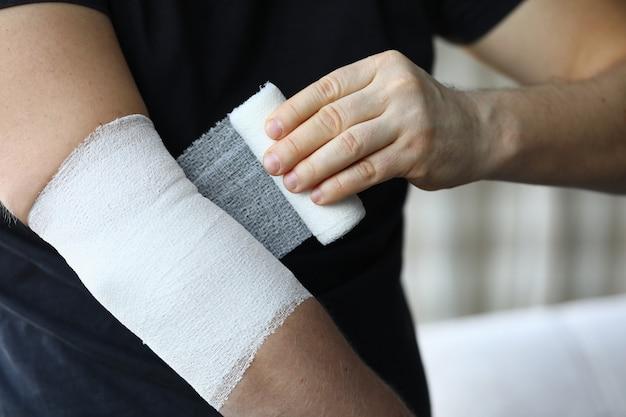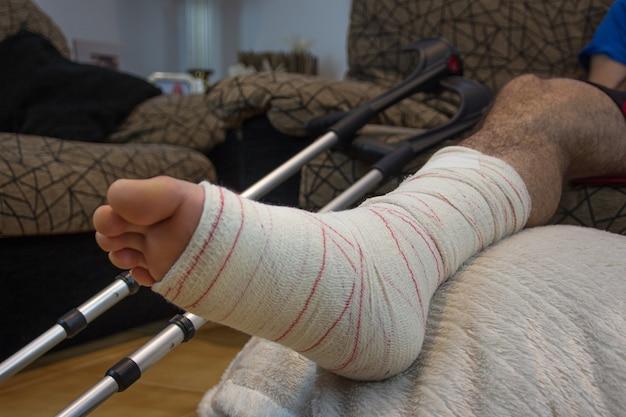Are you currently wearing a cast or have you ever wondered what it feels like to have a cast? If so, you may have experienced the tightness that comes along with it. But are casts supposed to be tight? In this blog post, we’ll answer this question and explore everything you need to know about casts.
From understanding the healing process to exploring alternative options, we’ll delve into the common concerns and misconceptions surrounding casts. We’ll also address the discomfort and potential skin issues that can arise from wearing a cast, as well as the importance of proper care and maintenance. So, if you’ve ever wondered why your cast feels so tight or what to expect during your recovery, keep reading to find out all the details!
Are Casts Supposed To Be Tight
Understand the Ideal Fit of Casts
When it comes to casts, the question of tightness often arises. Casts are intended to provide stability and support for injuries, but finding the right fit can be a challenge. So, are casts supposed to be tight? Let’s dig deeper into this common concern.
The Balance Between Comfort and Functionality
Casts are designed to immobilize and protect injured limbs, allowing them to heal properly. While they should provide a snug fit, they shouldn’t be excessively tight, causing discomfort or compromising blood circulation. The key is to strike a balance between comfort and functionality.
A Snuggle and a Squeeze – Finding the Goldilocks Zone
A properly fitted cast should feel snug, like a warm embrace from your favorite teddy bear. Think of it as a security blanket for your injured limb. It should provide gentle pressure without squeezing too tightly, promoting stability and aiding the healing process. It’s all about finding the Goldilocks zone – not too loose, not too tight, but just right.
Avoiding Unwelcome Complications
While a tight cast may seem like it provides better support, it can lead to unwanted complications. Excessive tightness can impede blood circulation, causing discomfort, and potentially increasing the risk of complications like pressure sores or swelling. That’s something you definitely want to avoid, trust me.
Listen to Your Body (and Your Doctor)
When you receive a cast, be mindful of how it feels. If you experience excessive pain, numbness, or tingling, it may indicate that the cast is too tight. Don’t hesitate to consult your doctor if you have any doubts or concerns. They are the experts who will be able to assess and adjust the fit of your cast to ensure optimal healing and comfort.
The Tale of Loosening the Straps
Now, brace yourself for a captivating tale. Imagine you’re a knight in shining armor, but instead of defending a castle, you’re protecting your injured limb. Just as a knight would loosen their armor after a long day of battle, it’s important to give your limb a breather too. Follow your doctor’s instructions on when and how to remove and reapply the cast. This will allow you to assess any changes in swelling or discomfort and make adjustments accordingly.
Wrapping It Up
So, are casts supposed to be tight? Not too tight, my friend. Remember, comfort and functionality go hand in hand. A well-fitted cast should provide the right amount of support without hindering blood circulation or causing unnecessary discomfort. Listen to your body, consult your doctor if needed, and give your limb a break when instructed. With this knowledge, you’ll be well on your way to healing like a champ!
*Remember, I’m not a doctor. This information is for entertainment purposes only and shouldn’t replace professional medical advice.
FAQs About Casts: Are They Supposed to Be Tight
Welcome to our FAQ-style section about casts! Whether you have a broken bone or you’re just curious about casts, we’ve got you covered. We’ll be answering some of the most common questions about casts and their tightness. So, without further ado, let’s dive in and put your worries to rest!
Is There an Alternative to a Cast
While casts are the most common treatment for broken bones, there are alternative options available. Splints, braces, and removable casts, known as orthoses, can sometimes be used instead. However, the choice of treatment depends on the severity and location of the fracture. Consult with your healthcare provider to determine the best option for you.
What Happens to the Skin under a Cast
Your skin works hard under that cast! It naturally sheds dead skin cells, which can accumulate over time. It’s important to keep an eye out for any signs of skin irritation, redness, or itching. If you experience severe discomfort or develop a rash, contact your doctor.
What Happens If You Take off Your Cast Early
Taking off your cast without medical guidance is a big no-no. A premature cast removal can disrupt the healing process and may lead to complications. Patience, my friend! Follow your doctor’s instructions and keep that cast on until they give you the green light.
Is a Cast Supposed to Feel Tight
A snug cast is perfectly normal. In fact, it’s essential for proper healing. However, if you feel excessive pain, numbness, or your cast feels unusually tight, reach out to your healthcare provider immediately. They’ll ensure everything is in order and make any necessary adjustments.
Why Does My Skin Burn under My Cast
Burning sensations can occur due to increased pressure on your skin, especially if the cast is too tight. It’s crucial to address this issue promptly, as it can lead to skin complications. Inform your doctor about the burning sensation, and they’ll guide you on the next steps.
Is a Bone Completely Healed When a Cast Comes Off
Casts are typically removed when the bone has healed sufficiently. However, bones continue to strengthen and remodel even after the cast is gone. Full recovery can take several months, so give yourself time to heal, and follow your doctor’s advice for a smooth post-cast journey.
What Should I Avoid While Wearing a Cast
Avoid getting your cast wet, exposing it to direct heat sources, inserting foreign objects underneath, or tampering with it in any way. Remember, a happy cast means a happy healing process!
Should a Broken Bone Hurt in a Cast
Some discomfort is normal during the healing process, but severe pain is not. If your pain becomes unbearable or increases over time, it’s essential to seek medical attention. Your doctor will evaluate the situation and provide the necessary guidance.
Is It Normal to Have Pain While in a Cast
While mild discomfort and soreness are common, severe pain should be brought to your doctor’s attention. Don’t suffer in silence; they’re best equipped to help you alleviate your pain and ensure your healing is on the right track.
Can Bones Move in a Cast
Bones immobilized in a well-fitted cast are less likely to move. However, in certain cases, if the cast becomes loose or broken, some bone movement can occur. Notify your healthcare provider immediately to address any concerns. Remember, “wiggle room” is not appreciated in the world of casts!
How Often Should a Cast Be Changed
The frequency of cast changes depends on the injury and the healing process. In general, casts are changed when they become soiled, damaged, or if swelling decreases significantly. Your doctor will monitor your progress and determine the appropriate time for a cast change.
What Happens If You Leave a Cast on Too Long
Leaving a cast on for too long can impede the healing process and potentially lead to complications. Follow your doctor’s instructions regarding the duration of cast wear and promptly schedule cast removal appointments. Rotten casts, unlike a fine wine, do not age well!
Can a Bone Heal without a Cast
In some cases, small fractures may not require a cast. Your doctor may opt for other treatments, such as splints or braces, depending on the nature of the fracture. However, the ultimate decision lies with your healthcare provider, so trust their professional judgment.
How Tight Should a Cast Be
A cast should be snug but not too tight. Your doctor will ensure a proper fit to promote healing, comfort, and mobility. If you feel your cast is too tight or causing excessive discomfort, contact your healthcare provider for evaluation.
How Do You Sleep with a Cast On
Sleeping with a cast can be a bit of a challenge, but fear not! Elevating the casted limb, using pillows for support, and finding a comfy position can help ease the discomfort. Just remember, sweet dreams are not canceled, even with a cast on!
Can You Get a Blood Clot from Wearing a Cast
While it’s not common, there is a slight risk of developing a blood clot, known as deep vein thrombosis (DVT), when wearing a cast. Moving your non-casted limbs, staying active within your mobility limits, and following your doctor’s instructions can help lower this risk. Keep those blood cells flowing!
Why Is My Cast So Uncomfortable
Think of a cast as a temporary but slightly intrusive accessory. Discomfort can arise from pressure points, swelling, or adjustments needed for proper positioning. If the discomfort becomes unbearable or if you notice any changes, consult your doctor as soon as possible. Hasta la vista, discomfort!
What Happens If You Don’t Cast a Broken Bone
Leaving a broken bone untreated without adequate immobilization can lead to improper healing, deformity, or impaired function. It’s crucial to seek medical attention when you suspect a broken bone, as early intervention promotes a better outcome. Remember, “boneless” chicken belongs in the supermarket, not inside your body!
How Do You Get Used to Wearing a Cast
When you find yourself in a cast, it may take some time to adapt. Embrace the challenge, focus on the end result, and explore coping mechanisms like distraction techniques, gentle exercises (as advised), and seeking support from family and friends. You got this! Casts may be constricting, but they won’t crush your spirit!
Is a Splint Better Than a Cast
Splints and casts serve different purposes depending on the type and severity of the injury. While splints provide flexibility and easier access for cleaning and monitoring, casts offer more stability and protection. Your medical professional will determine the most suitable option for your specific situation. It’s like choosing between a taco and a burrito – different, but both delicious!
Why Do Casts Smell
Ah, the intriguing aroma of a cast! Casts can develop an odor due to the buildup of sweat, dead skin cells, and bacteria. Fear not, for there are ways to combat the smell. Cleaning the skin around the cast, using antiperspirant sprays, and allowing fresh air to circulate can help combat the cast stink. A smelly cast is nobody’s idea of a good time!
There you have it—our comprehensive FAQ-style section addressing the tightness and other burning questions about casts. We hope you found it helpful, and your concerns have been cast aside. Remember, when in doubt, consult your healthcare provider for the best advice tailored to your unique situation. Stay strong, heal well, and keep rocking that cast like a pro!

